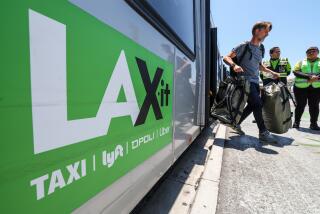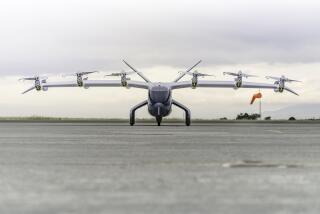Prime Time Merger Yields Bad Times : Transportation: Two major airport shuttle companies joined together just as the economy was sliding into recession and people were putting off travel plans.
- Share via
John Kindt and Rod Ramsey decided to merge their airport shuttle businesses last November. At the time it seemed like a good idea. The young shuttle industry was growing rapidly and by combining the two operations into Southern California’s second-largest airport shuttle company, they could quickly get a jump on a bigger market share while benefiting from economies of scale.
But things haven’t quite gone according to plan.
The merger of Prime Time Shuttle and City Shuttle, both formerly based in Van Nuys, into a new Sun Valley-based company, also called Prime Time Shuttle, came just as the economy was sliding into recession and people were putting off travel plans. When the Persian Gulf War started, the travel industry came to a standstill and Prime Time’s business fell by 50%. Meanwhile, small competitors have continued to crop up in the loosely regulated business, taking customers away from industry leaders such as Prime Time and SuperShuttle, the Avis and Hertz of airport shuttles.
After laying off about 20 workers, closing a satellite office in Orange County and realizing a substantial loss in February, Kindt, Prime Time’s president, is serious. “The truth is we’ve had a hard time in this merger,” he said.
Even before the merger, things weren’t easy. Prime Time went through about a year of unspecified losses before the merger, Kindt said, because of the costs of expanding the company quickly. And although air travel has begun to pick up again, the new Prime Time faces a tough time ahead because competition from large and small shuttle companies is intense.
The airport shuttle business came out of a 1981 state Public Utilities Commission decision that deregulated a market dominated by cabs and buses. Shuttle companies use vans to drive several passengers at a time to and from airports and charge about half the price of a taxi ride. A trip from Sherman Oaks to LAX on Prime Time Shuttle, for instance, runs about $20.
Dozens of shuttle services have surfaced in Southern California in the decade since the PUC decision. Kindt and Ramsey both started their companies in 1986, and last year the combined firms took in $9.5 million in revenues and averaged more than 50,000 rides a month. Kindt owns 70% of the new Prime Time and Ramsey, vice president and chief financial officer, owns 30%.
Prime Time has about 350 employees, including Kindt’s sister and his attorney wife, Anne, who quit her law practice to help the company through its hard times. Prime Time’s 100 red vans ferry customers from Castaic on the north and San Clemente on the south--and from the ocean to Ontario on the east--to LAX and the Burbank, Long Beach and John Wayne airports.
Ernie Gallipo, president of Los Angeles-based Transportation Consultants of America, called the Prime Time merger “dumb.” Size, he said, won’t necessarily lead to profits in the shuttle business. “Each one had equipment and wanted to make themselves bigger. They now have more equipment, but it didn’t solve anything,” he said.
Indeed, SuperShuttle, the area’s largest shuttle service and several times the size of Prime Time, is just squeaking by. The eight-year-old SuperShuttle carries about 400,000 customers a month nationwide, including 120,000 in the Los Angeles area. The Los Angeles-based company grossed about $48 million last year but only broke even, said John Goss, SuperShuttle’s president. Goss recently cut back the number of vans in operation to 150 from 192.
It’s tough to make a buck in the airport shuttle business because the industry “is in such an upheaval,” Goss said.
But Kindt said he’s convinced that the merger will pay off in the long run. Now that the war is over, travel is picking up again, and Prime Time will start to benefit from efficiencies such as its own carwash and a new computer system for tracking rides, he said.
Kindt said he’s also looking for other sources of revenues. Prime Time recently began courting companies that have employee ride-share programs and plans to expand service soon to the Ontario airport and, eventually, San Francisco International. Also, the company is starting a marketing program with United Airlines in April.
Meanwhile, Kindt and Goss said their biggest complaint isn’t with each other. Rather, they fear the small operators that increasingly encroach on what they consider to be their territory.
On any given day at LAX, vans from as many as 40 shuttle services might be waiting to pick up customers. The problem, as large operators such as Kindt and Goss see it, is that most are small van services that don’t bring customers to the airport--the expensive part of the shuttle equation because of the costs of maintaining a reservation system, dispatchers and routers.
But the smaller shuttle operators vie for curb space in front of airport terminals and circle the loop repeatedly, picking up riders who might have planned to take Prime Time. Kindt said he needs those round-trip customers to make a profit.
Part of the problem, said Gallipo, the consultant, is that it’s too easy to obtain a license to operate an airport shuttle service. All it takes is payment of a $500 fee along with an application to the PUC--no hearings are required, as they are for taxi and bus companies, he said. Clifton Moore, executive director of the Los Angeles Department of Airports, said his staff is preparing a survey to gather information on shuttle services and is “trying to convince the PUC that they’ve already licensed enough for the time being.” But, Moore added, “Our goal is to maximize the efficiency of the system”--not create rules that favor certain companies over others.
Kindt, 32, grew up in the Valley and earned a business degree from Pepperdine University. After dropping out of Georgetown University law school, he returned to Southern California and tried to land some acting jobs. To earn his keep, he worked for a limousine service. Acting didn’t pay and driving did, so Kindt borrowed money, bought his own limo and began ferrying executives around town.
Soon he started receiving requests for airport service. When he saw SuperShuttle’s vans, “I just knew they were going to succeed,” he said. Using $6,000 in borrowed money, he purchased two vans and hired high school students to hand out flyers door-to-door.
While Kindt was expanding Prime Time “van by van,” Ramsey was doing the same thing and soon began making overtures to Kindt to combine their operations. At first Kindt wasn’t interested, but when a major Prime Time investor--a local builder hurt by the real estate slowdown--wanted his $500,000 investment in Prime Time converted to a loan, Kindt decided on the merger to keep the business growing.
After the cash-free merger was completed in November, the company got a $500,000 bank loan and installed the new computer system. At Prime Time’s austere offices, reservation agents man phones and enter data on computer terminals. Other employees track drivers, map routes and assign pickups. Mechanics work on vans in the large garage where drivers check in.
Kindt is still waiting for the shuttle business to make him rich. He and his wife have a modest lifestyle, he said. They own a small house in Granada Hills.
“We’ve had to learn some serious lessons here,” Kindt said. “But I’ve hung on through the hard times. Now I’ve got a bigger hook that will pull me out of this.”
More to Read
Inside the business of entertainment
The Wide Shot brings you news, analysis and insights on everything from streaming wars to production — and what it all means for the future.
You may occasionally receive promotional content from the Los Angeles Times.











